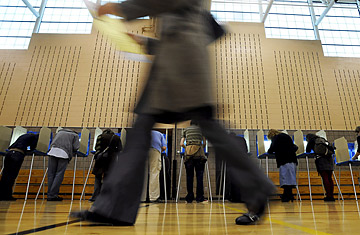
People fill the voting booths at an elementary school in Minneapolis
The first round of data from exit polls is out, and there are some demographic trends that may (or may not!) tell us something about what to expect tonight. But remember: Exit polls are compiled from interviews with voters as they leave polling places. They are notoriously unreliable.
Theoretically, interviewers are supposed to stop voters at random — choosing, for example, every ninth voter to survey. But that is easier said than done when you are standing outside a crowded polling place desperately searching for a friendly face.
In the past, exit-poll interviewers have oversampled Democrats. Remember 2004? Exit polls projected a John Kerry victory by 3%, while the official count had Bush winning by 2.5%. More recently, exit polls were a mess during this year's primaries, especially in Obama's case, as no one needs to be reminded. Today, this bias may be particularly strong, since Democrats are so gosh-darn exuberant about their candidate — and thus most likely to talk to exit-pollers.
O.K., now you can go nuts. Here are the early trends based on Associated Press exit-poll reports:
• Six out of 10 voters picked the economy as the most important issue facing the nation. No surprise there, but nothing else came close: not Iraq, not health care, not terrorism.
• Still, two-thirds of voters said they are concerned about being able to afford the health care they need.
• Interestingly, at least as many said they are worried there will be another terrorist attack in the U.S. Then again, who would say no to this question? Worry is cheap.
• One in 10 voters said they voted this year for the first time in their lives. These new voters were disproportionately young and nonwhite, as we would expect.
• One in five new voters was African American.
• More than half of voters said they are against the government's bailout plan. It's unclear what this might mean for the candidates, both of whom supported the plan. But it could mean voters are in the mood to punish anyone associated with the good old days.
• Only one in five voters had a good opinion of George W. Bush, and Congress was even less popular. Again, probably safe to say this one is a keeper.
